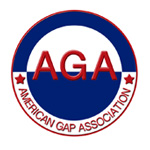WHAT DOES AGA ACCREDITATION MEAN?
Accreditation by the American Gap Association is a means of assuring a safe and quality experience for the student. Accreditation by the AGA also stands as a significant standard for Educational Counselors and Admissions Counselors to both recommend good programs and to understand a baseline of shared experience when accepting a student who has completed a program of an organization accredited by the American Gap Association.
In years past there was a false belief that Gap Years were either only for privileged kids and thus were merely a suffocated introduction to the world at large, or perhaps at their lowest estimation were only for those who were unfit for college. Accreditation through the American Gap Association is a definitive way to show that students who have successfully completed one of our Members' programs will be exposed to real world concerns, properly supervised so that potential lessons ready-to-hand are debriefed for best learning and transformation, and true cross-cultural awarenesses are facilitated.
Safety is of course paramount - though a great experience can be made out of most every circumstance, it's the ones that return you home safe of body, mind, and soul that will no doubt have the most lasting of positive effects. While each organization takes care of its students in different ways depending on their unique program model and location, the Standards are designed to focus on measurable and concrete ways to assure a student's holistic safety. As education and culture are gaining an understanding that safety is far more than physical, so too must organizations build adequate safeguards to ensure a holistic approach to the student.
Quality, in this sense, means not only a clear set of expectations and organizational integrity, but just as well a clear understanding for the types of experiences a Gap Year student will be exposed to. In every case, the final experience is up to the student to make the most of - just as at university - but the quality guaranteed from AGA Accreditation will also describe a commitment to AGA pedagogy.
AGA PEDAGOGY:
The pedagogy that is referred to as "Gap Year Education" in our mission, is essentially one built on experiential education - a method in which to instruct beyond the usual lecture or 'four-walls' classroom. Traditional education certainly has its place, however, at the American Gap Association, as with the emerging data, exposure exclusively to the traditional pedagogical models doesn't address the needs of every student. Experiential learning, as defined, is making meaning from direct experience. Experiential education is taking experiential learning and applying a learning methodology to it. For instance, rather than simply witnessing a Semana Santa celebration in Guatemala, or a wake in New Orleans, the experience is typically discussed or consciously staged before the event, then witnessed, then debriefed to maximize the learning. There are a variety of pedagogical models that will fit the experiential education motif, but common among all of them are the wind up, and wind down from the actual experience.
The pedagogy of the American Gap Association is, however, more encompassing than simply experiential education. It's an understanding of the holistic approach to developing a whole human - this includes encouragements for outdoors activities, self-reliance activities, reflections, language exposure when appropriate, and fundamentally developing the skills to see things from another cultures' perspective.
USE OF THE STANDARDS
The American Gap Association Standards are designed to of course recognize and support Gap Year organizations to be of the highest quality. They are also designed to be a framework for anyone wishing to design their own independent Gap Year. Gap Years take many forms, and while AGA Members have proven their commitment to the highest caliber possible, your student's individual Gap Year might be a simple volunteer placement they find or network themselves. We invite the development of our Standards to be used by anyone desiring to take a more independent route for their Gap Year. Hopefully, by understanding the full range of concerns in designing a safe and quality AGA program, your student too can emerge with similar success ratios as are emerging from Gap Year research.

